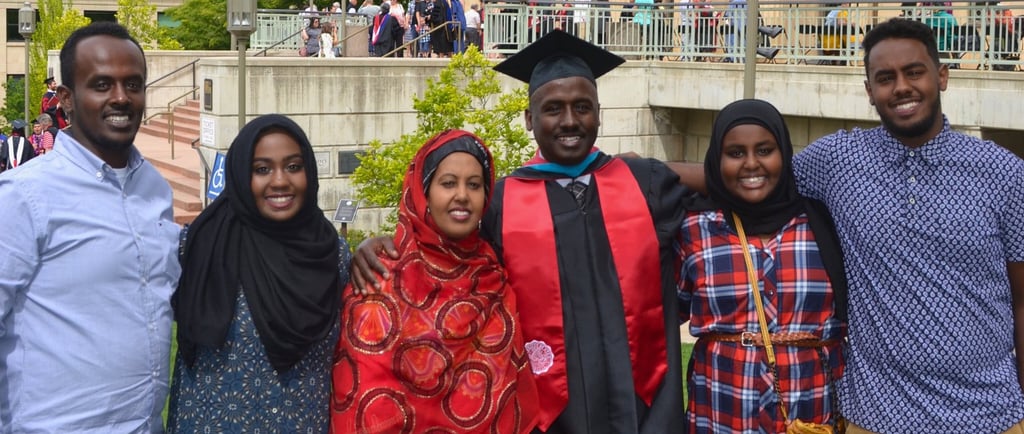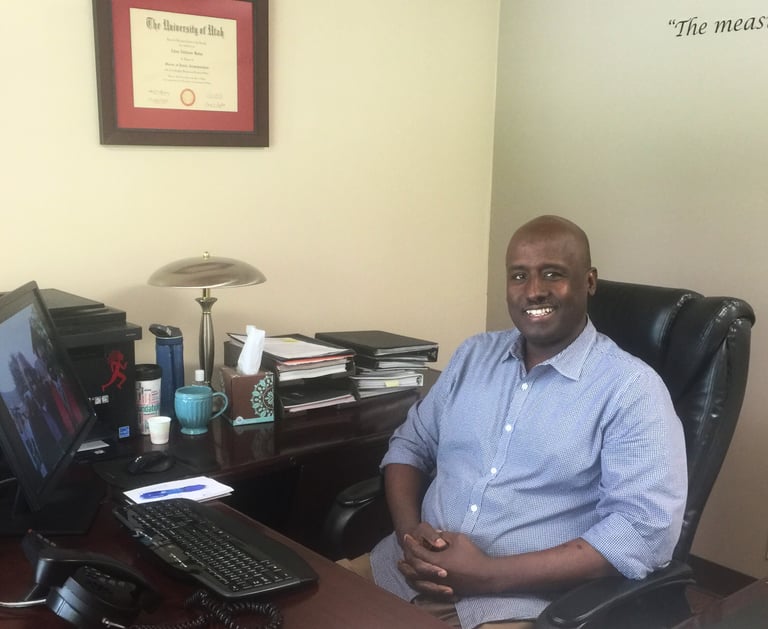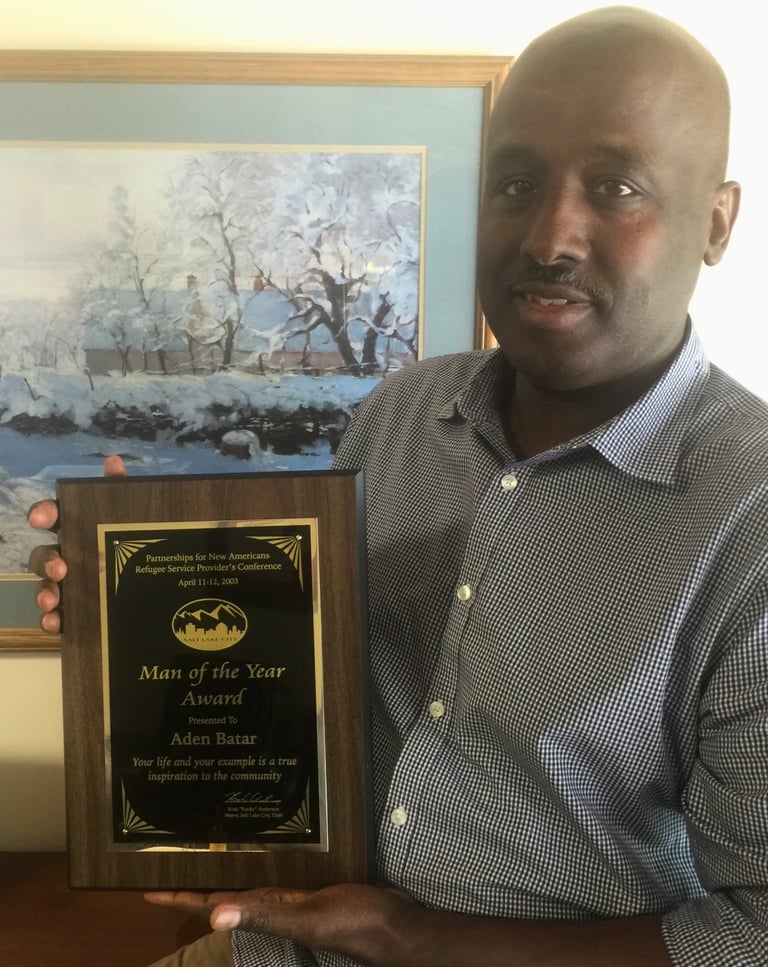The Long Road Home
"Resettlement father" leads Utah refugees by example
PEOPLE


Editor's note: This story is a long-form feature and realistically takes up to 10 minutes for the average person to read. However, we promise it will be well worth your time. Utah is a heartbeat in America's refugee resettlement efforts, and this man, Aden Batar, plays a significant part in giving it life.
Aden Batar remembers when he became a refugee as if it happened yesterday. It was two decades ago when he was living life day-to-day as a survivor of the Somali Civil War.
Batar’s brother-in-law had searched for him on the streets of Mogadishu, Somalia, to tell him that a pot of boiling water fell on Batar's 2-year-old son and severely burned the boy from the neck down. “He’s alive,” the brother-in-law said, “but when you see the condition he’s in, you will not recognize your son.”
Before his relative finished speaking, Batar raced home to see his son. "He was not moving at all," Batar remembers, pausing with still-raw grief. "He couldn't even cry the way he was burned. I became like, how can I save my own son? If I had the ability to do whatever I could do that day, I would have done it."
But he couldn't help his son. The war had closed all the hospitals. Most of the doctors had fled.
After burying the boy, Batar and his wife agreed that he would leave the country. "I'm done; I don't want to stay in this life." He was willing to risk warring tribes as he fled on foot to Kenya, temporarily leaving his family behind.
Utah Welcomes its First Somali Refugees
Two years later, Batar and his family became the first Somali refugees in Utah. Now he uses his survivor skills to help others who have fled persecution in their homelands for security and opportunity in the United States. As the immigration and refugee director at Catholic Community Services (CCS) in Salt Lake City, Utah, he has helped resettle more than 7,000 Somali refugees, as well as thousands more from other countries.
"I remember it was exciting when Aden came because it was a first to receive a Somali family at CCS," recalls Lina Smith, senior director, Refugee & Immigrant Center, Asian Association of Utah (RIC-AAU.) She was the refugee director at CCS when Batar arrived and handled his resettlement process. That wasn't easy for Smith; CCS didn’t have a Somali case manager or interpreter then. She relied on Batar's brother-in-law, a student in Logan and Batar's sponsor, to help translate. "The thing I remember about him from the beginning is that it was his dream to help his community."
That started, though, with Batar helping himself. When he arrived, CCS provided resettlement resources for 90 days. That included money for rent, utilities, clothing, household supplies and food stamps. Then, financially, Batar was on his own. "So, I did all I could by getting a job, going back to school to learn English and providing to my family," he says. "I wanted to take care of my family without getting any public cash assistance."
Aden Batar celebrates with family at his 2015 commencement ceremonies at the University of Utah. Photo courtesy of Aden Batar.
As Utah's refugee settlement leader, Batar settled the first group of Iraqis in Utah and formed the Somali Community Services of Utah. He also helped establish some of Utah's mosques for the Islamic community in Salt Lake.


From Juris Doctor to the Factory Assembly Line
With some English skills, Batar obtained a job assembling exercise equipment on a production line for $4.25 an hour. It was the first factory job for him, a former businessperson in Somalia with a law degree, equivalent to a Juris Doctor degree, from Somali National University. Before he could use the degree, the war broke out. So, as a new refugee, Batar worked double shifts at the factory in order to pay his bills while studying English at Utah State University.
Batar was on the road to independence. "I was not getting enough sleep, though," he recalls. He frequently returned to CCS, hoping to find better work. Two years after arriving in Salt Lake, Batar approached a fork in the road. "I visited CCS, and when I arrived, Lina took me into her office and said, 'Oh, thank God that you came to our offices today. I know that you have been coming here every day, and today is your lucky day. We have six Somali families coming in tonight, and I need help. Can you start now, today, as a case manager?'"
Using his Ford Taurus station wagon, Batar spent the rest of the day transporting new refugees from the airport to their lodging. "I slept on a friend's couch in Salt Lake that night, and for the next three weeks until I could move my family from Logan," he recalls. He quit his factory job and received a letter of recommendation that he never needed to use with another employer.
Stepping Into "Fatherhood"
"I remember that he saved us that day," says Smith. "I really believe God sent him to us to help these people. Without him, I honestly don't know what we would have done that day. Aden had the English and Somali languages, but my philosophy is that you can train the skills, but not the heart and attitude for it. Refugees see him like the "resettlement father" because he's a very genuine, big-hearted person."
As a case manager, Batar settled the first group of Iraqis in Utah and formed the Somali Community Services of Utah. He became a leader in his Islamic community as well, helping to establish new mosques in Salt Lake. Additionally, he's received several community awards and, two years ago, a master's degree in public administration from the University of Utah. When Smith left CCS for RIC-AAU in 2001, she asked Batar to fill her shoes.
"He took off in the role," recalls Smith. "He knew what had to be done and did it above and beyond. It's a natural thing for him to be in this role because everything he came with prepared him for this."


"When you arrive, don't say this is too difficult. Because you have already survived worse. It takes a lot of courage to be a refugee." -Aden Batar
Different Refugees, Different Journeys
Batar's success story, though, is not typical, says Gerald Brown, assistant director, and refugee coordinator for Utah. "Aden has had a tremendous advantage that has shaped him as a force for good," says Brown. "He was already educated in his homeland, but many are not. If a refugee is illiterate in their home country, or born a refugee, it's going to be a different journey for them here."
Two years ago, Brown assisted the State in establishing the Utah Refugee Education and Training Center at the Salt Lake Community College Meadowbrook campus. At the center, refugees receive education, training, and skills to establish themselves in the local workforce, a resource Batar didn't have when he resettled. "He was at a disadvantage that way then," acknowledges Brown. "He came when we didn't have a good system. But he kept persisting, which is actually the most helpful resource a refugee has."
Batar says he tells refugees that persistence is the most important skill they have and that they are already survivors. "That is, in itself, a skill they can use here, too," says Batar. "When people come [to CCS] you see someone who has never worked their life in a production line. But it's a way of life. You earn money. You will put food on the table for your family. But that shouldn't be your end goal. You're going to further your education or skills. And then tomorrow, you're going to get a better paying job. But in the beginning, when you arrive, don't say this is too difficult. Because you have already survived worse. It takes a lot of courage to be a refugee."
